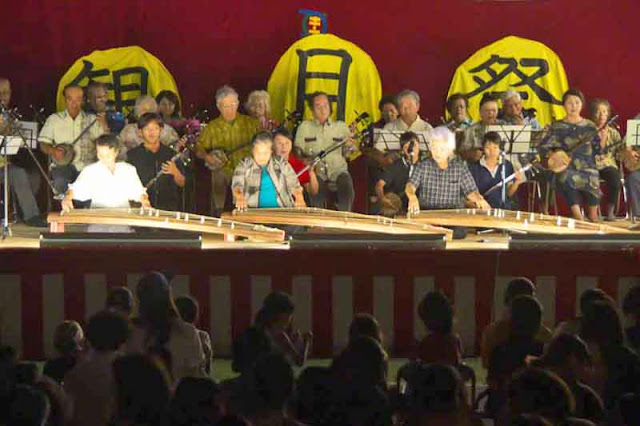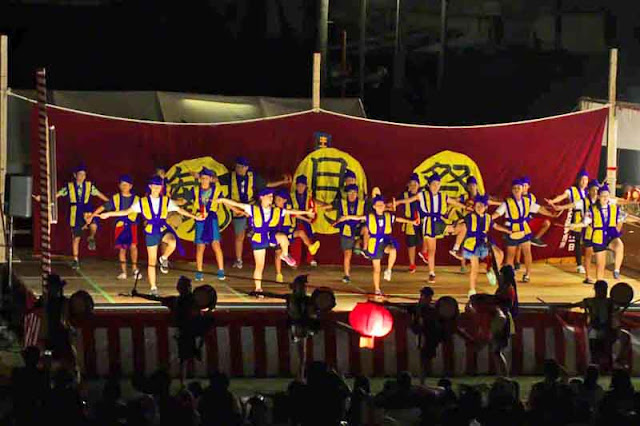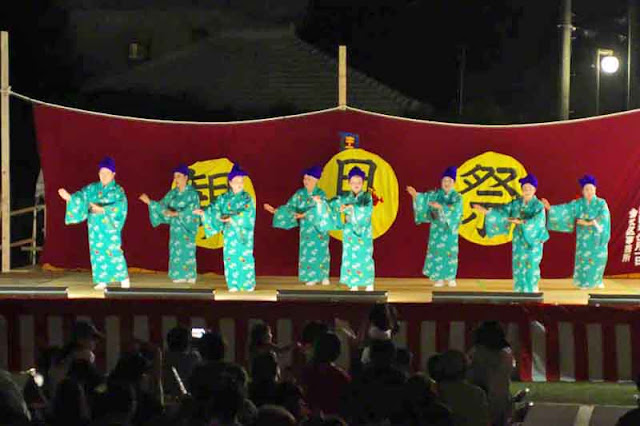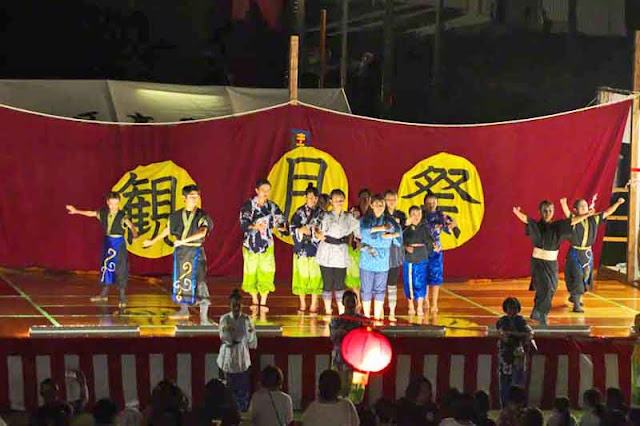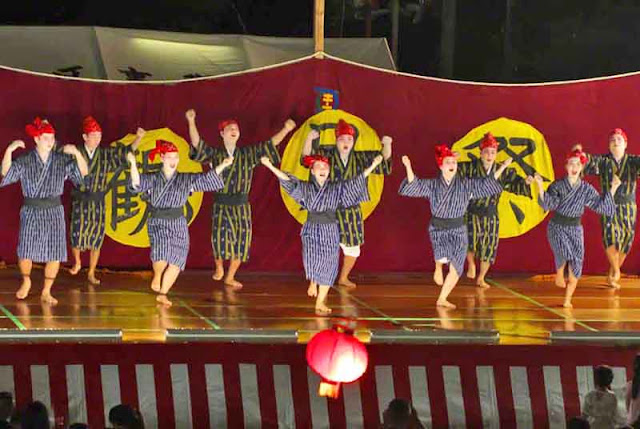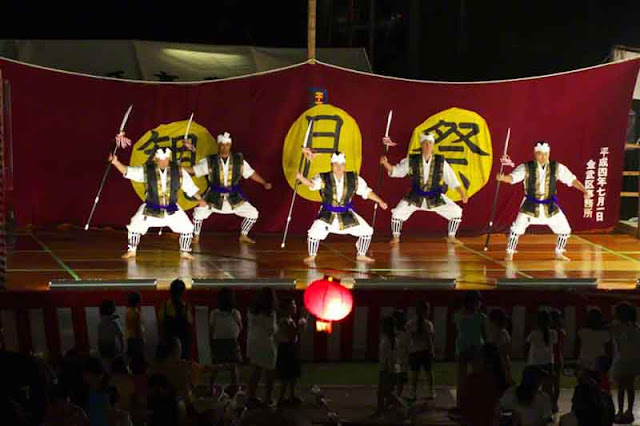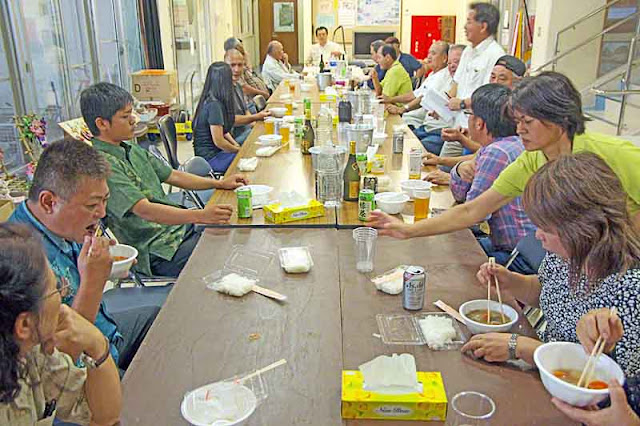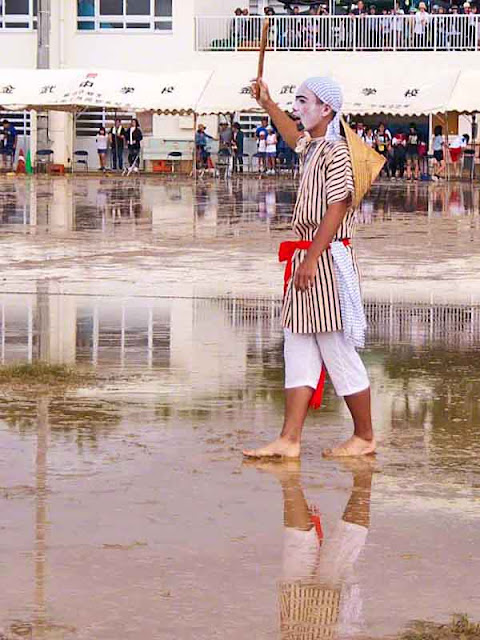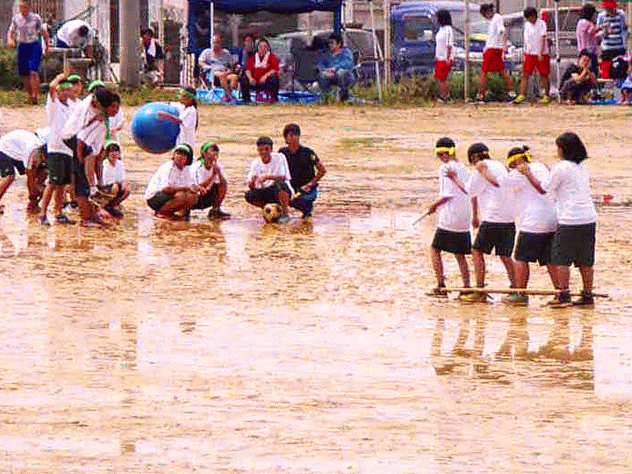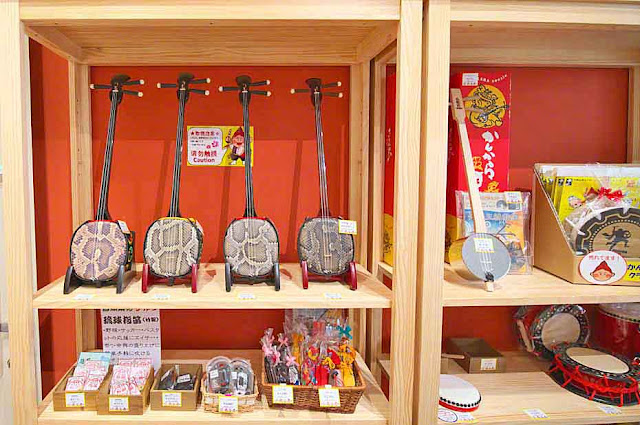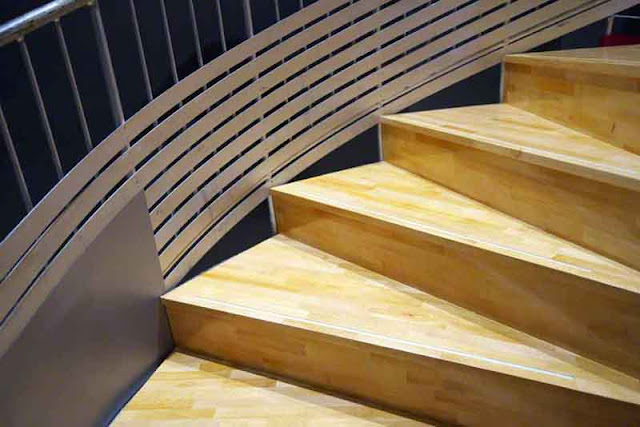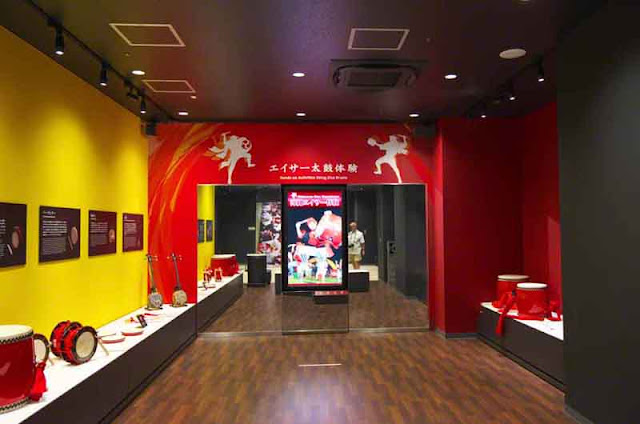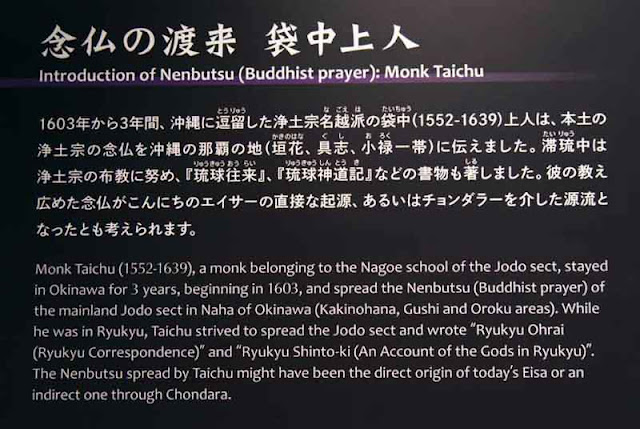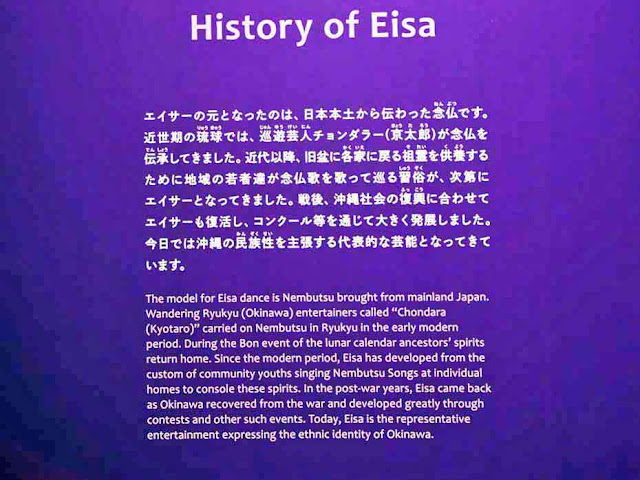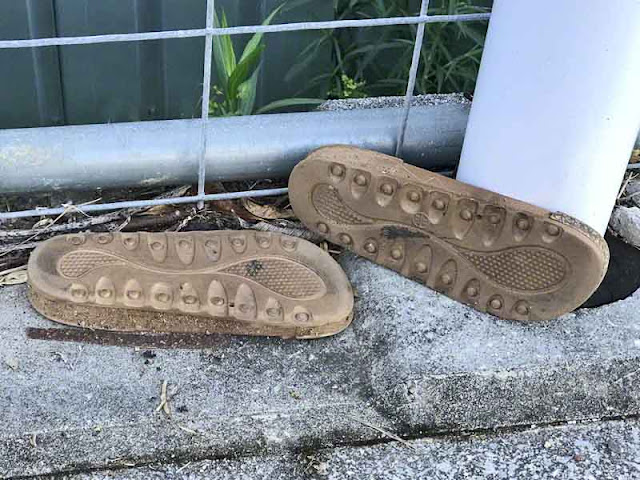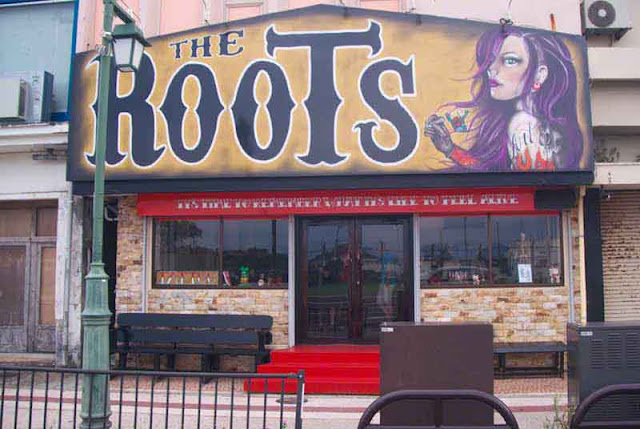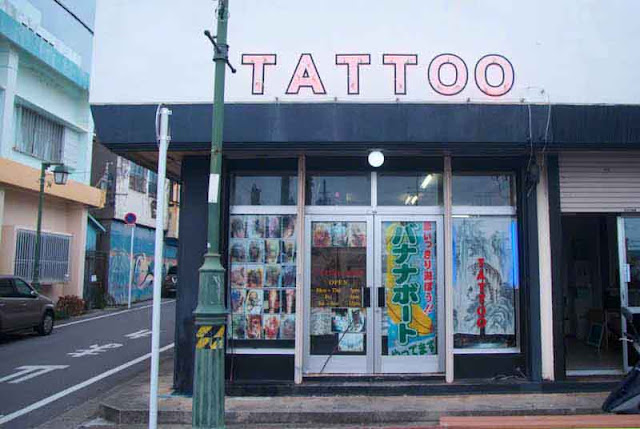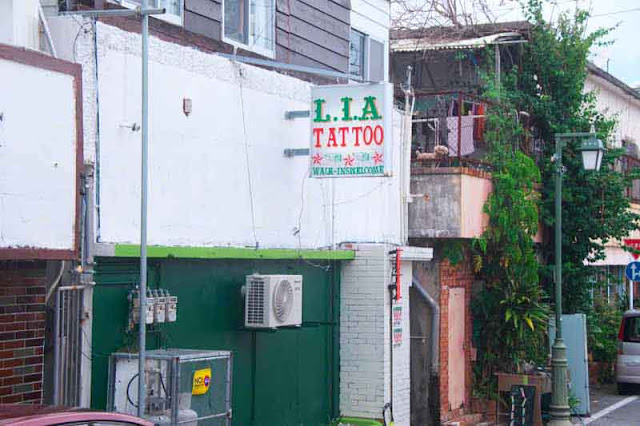
Have a look at photos of wildlife, festivals and travel sites here. Sharing tips for travelers with a twist of humor is part the life I enjoy in Okinawa, Japan. Photos and text Copyright © Michael Lynch. All photos contain traced digital watermarks. You may contact:http://www.ryukyulife.com/ for licensing.
Wednesday, September 26, 2018
Tuesday, September 25, 2018
15 Harvest Moon Festival Photos
Plus the September 2018 Full Moon
It's not really called a Harvest Moon Festival in Okinawa, Japan.
Kangetsusai is what the festive event is named in this part of the world.
Tropical storms bouncing around the Asian oceans could have canceled this celebration.
A few hours ahead of time, I slipped out of the house to get my camera and lenses.
There was a good chance rain would hit on and off over the next few hours.
Accidentally, I left my iPhone at home in the charger so, nobody could contact me.
If it started pouring down rain, the wife would demand I get back in the house. Hah!
The first few performances on stage went smoothly and things were dry.
You can see the crowd sitting before the stage, watching some sort of royal dances.
The way lighting is set up on the stage makes photography challenging.
It's nice to get images of everybody but, zooming in on a few makes things easier.
Usually, I don't intentionally miss anyone, unless they are really ugly.
Just kidding. We can't say stuff like that anymore. Or, can we?
Look closely at this scene and, you may notice the angle of my camera has changed.
The red lantern in the center of the frame was overhead in my first few photos.
Climbing a flight of stairs, I found a balcony where I could stay dry if it rained.
All the kids doing Eisa had to be photographed so, I wouldn't miss someone special.
My granddaughter is up there dancing. She's not one of the ugly ones.
No expert on the performing arts, I just call these dudes, cupcake dancers.
That's because we aren't supposed to call folks fruitcakes anymore. Hah!
These ladies in green kimonos were easy on the eyes and, the stage was still dry.
People sitting on folding chairs in the audience didn't need umbrellas, yet.
One of these days I should learn the names of all the classic Okinawa dances.
This is one I've seen them do up north in the woods. Still, don't know what it's called!
The girls with the golden fans are posing in puddles on that wet stage.
A few umbrellas are visible in the audience but, most people ran away.
It started pouring like a typhoon hit us and, I'm glad I was sheltered on that balcony.
Somebody Tried Calling Me
That's when she discovered my phone was home in the charger. LMAO
Somewhere, I read that people who are forgetful are really geniuses. I must be one of them.
We'll just call this one "The Pink Ladies with Purple Hats."
Look at the reflections in the puddles on the plywood stage. It could get slippery.
These youngsters must attend some performing arts school. They are really impressive.
Some traditional Okinawa music is jazzed up and they dance to it.
The barefoot red bandana ladies, we'll call this group.
They're singing and dancing to an old Ryukyu tune, not YMCA.
Call them Real Men Do It with Spears Dudes.
They're barefoot in the puddles. I'm happy on my balcony, where it's dry.
Guys with white shoes and flowery hats are dancing in the plywood puddles.
The rain has stopped and, children are gathering in front of the stage.
This character called Miruku gets on stage and children go wild.
Miruku will toss candies throughout the crowd.
Notice the silhouettes of children with arms outstretched reaching to catch flying candies.
The grand finale is the Shishimai and his handler.
The creature is activated by two youngsters under that hairy lion's body.
After four hours of composing festival photos and dodging rain, I decided to leave early.
The moon never did stay clear of rain clouds, long enough to be photographed.
Walking home with the camera and tripod, the rain poured down again.
Just as I entered the gate at home, I noticed the moon peeking through the clouds.
It's not my favorite moon shot but, it's probably the only one I'll get this month!
Sunday, September 23, 2018
Sports Photo of the Day
Love It When a Granddaughter Smiles
Especially when she passed everyone on the athletic field in a relay race.
It's a busy weekend and I took over 1000 photos of an Undokai so, I'll be brief.
More later.....
Saturday, September 22, 2018
Okinawa Minutes Before Sunrise
Kin Power-plant and part of Ikei Island at 6:09 AM.
Sunrise took place seven minutes later but, I liked this photo better.
Labels:
Ikei Island,
Island,
Kin,
Okinawa,
power-plant,
Sunrise
Wednesday, September 19, 2018
Sunday, September 16, 2018
Another Look at Shimakanka -- Rituals in Okinawa
Published Again at Stripes Okinawa
This has been seen before online and in the print version of Okinawa Stripes.
The article showed up yesterday in the internet version, minus a few photos.
In order to fill in the blanks, for those interested, I'll include the whole story here:
Sacrificial Cows and Stone Lions
A guidebook for the Village of Ginoza led to the discovery of three ancient stone carvings, located within the district of Sokei and the legend behind annual rituals performed there.
The statues were placed in the north, south and west boundaries of the settlement to ward off evil.
Known as “Shisa” throughout most of Okinawa, they are referred to as “Ishigantou” in Ginoza.
The printed manual mentioned that cattle were sacrificed at each site on the 5th day of the 9th month, by the Lunar calendar. Off the main road, unheard of events like this, are a cultural explorer's goldmine.
The stone lions were all located within a couple of days but, the rituals wouldn't be witnessed until another Gregorian calendar year passed by. As fate would have it, the statues positions were discovered late in October of 2014. The village had held the event a month prior. Believe it or not, the Chinese calendar had a Leap Month that year. And, the rituals were performed during the ninth month of the first one, which had been in September 2014.
That gave a whole year of time, to make liaison with village officials, do research on the history and traditions, and obtain a translator for the event.
Sokei Shimakanka
In this area of Okinawa, cattle are no longer slaughtered, in front of the statues, during the ceremonies.
Each of the three Ishigantou are visited by a procession of men. Women are not permitted to witness the events, except at a distance. A news reporter and Japanese/English translator, along for this story, were asked to keep themselves at a back far from the scene. Rituals are conducted, by men only.
The first stone lion visited, rests on a pedestal at a “Y” intersection. A box, known as a binshii is placed on the ground and men squat to pray. Prayers are led by a village elder, who has learned the words from one of his predecessors and, is probably the only person in town, who has them committed to memory. Offerings are made, utilizing local sake (awamori), rice and incense, after prayers are uttered. Sake being poured over each statue's head adds a distinct scent to the fragrance of burning incense drifting through the country air.
The men travel to each of the Ishigantou, the second one, being along a side street, to perform the rituals.
At each of the three statues, a bit of the awamori is sipped by the attendees and, chunks of beef (not easy to chew) are consumed. Those desiring a juicy Filet Mignon should abstain from sampling. The meat has a texture similar to rawhide, only it is boiling hot.
The third stone statue is the smallest and, is located on the outskirts of the district, at the edge of a field.
From this location the Pacific Ocean is visible and, a refreshing breeze from the sea gives some relief from the blistering hot sun.
Here the rituals are repeated and, as in previous stops, the district mayor first, samples the beef before passing the bowl around. Spirits are sipped by all in attendance and the entourage walks back into town, to visit the community center.
Females Now Welcome
Everyone assembles inside the Kouminkan (community center) for a meal and some alcoholic spirits.
The district mayor sits at the head of the table and some of the village elders explain the importance of the events which just took place outdoors.
Fortunately, women are invited and questions may be asked, to learn more about the rituals associated with this event called a Shimakanka. A handout was given to everyone in the room and, it thoroughly explained the legend behind the ceremonies we had just witnessed.
A Grisly Folk Tale
Long before this island became Okinawa, it was Ryukyu and, way before the Ryukyu Kingdom existed as an independent country, the land was ruled by Lords, known as Aji. They built castles in their territories, to defend the populations and lands, under their control, from other Aji, seeking to increase their power.
One of these Lords had an only daughter. An epidemic, raging through the islands, took the life of his beautiful young girl. Heartbroken and grieving, he buried her in a cave along the east coast of the island.
That same day, a young man who had bought a cow was heading home with his animal tied to a rope.
Dark clouds suddenly appeared and, he decided to take shelter from an approaching thunderstorm. As the rain began to fall, he tied the cow to a nearby tree and took shelter at the entrance to the cave.
From the overhang of the cavern, he watched water splash as small streams flowed, carrying leaves and earth away from just outside his shelter. He shivered and thought how lucky bovines must be. Their thick hide protects them from the ice-cold rain. The weather didn't seem to phase cattle. And, he started thinking, how nice some of his grandmother's hot tea, would be, to have right now.
Extremely Chilling Experience
Shaking and coughing from getting wet, he thought he may be catching a cold and wanted to get home.
As the rain slacked off, he decided to get out of the cave, grab the cow and hurry on towards home.
He knew, for sure, grandmother would insist, he changes clothes and drinks a steaming kettle of hot ocha.
Then something happened to really make him want to hurry out of that shelter. A voice shouted. It was a woman's scream from under a pile of stones in the cave. “Help me. Please get me out of here!”
Thinking, it was a ghost the boy began to run. On his first step to leave the cave, a hand grabbed him by the hair on the back of his head. When he tried to run, the grasp just became tighter. The voice cried out, “Help me, please. I'm a young girl who fainted with illness. My parents thought I died and buried me here. I am alive; help me!”
Assured that it was a human in need, the young man removed the rocks burying her body and rescued her. The rain stopped and he carried her outside. He scooped fresh water from a flowing spring and nourished her. Leaving the cow behind, he carried the young woman, on his back, to her father's castle.
Exuberance at the Castle
The sentries at the castle announced the miracle of the princesses return. Everyone was ecstatic, the Lord's only daughter had survived. This was an occasion for a feast and a big celebration.
The Aji announced to the lad, “As a reward, I will give you anything you desire.” Without blinking an eye the boy said, “OK. I'd like to have your daughter as my wife.”
The Lord roared, “Peasant, you can't have this woman of royal blood as a bride!” That, got everybody shaking. “Father, I have already been considered dead, once. Please, let me be this man's wife.”
The daughter's plea touched the Lord and, he gave the blessing for their marriage.
Slaughter of the Cow
The young man escorted an entourage, from the castle to the cavern, where the girl had been buried.
The gravesite in the mountain was cleaned up and the cow was sacrificed near the cavern entrance.
Pampas grass, tied in loops was soaked in the animal's blood and used to shoo away evil spirits.
Today, the loops of grass, known as, “San” may be seen placed as amulets to ward off evil.
The San may be seen at entrances to villages and, at the corners of homeowners properties.
In some locations, they may be soaked in animal's blood but, no blood was seen in Sokei, Ginoza.
Photography and text by Michael Lynch
Verbal translation by Mami Sakiyama
Text translation by Alina Rădulescu (Folklorist)
Sketch by Atsushi Maezato
Wednesday, September 12, 2018
Wordless Wednesday: Security
Sunday, September 9, 2018
Reflections of a School Sports Day in Okinawa
An Undokai is a Big Family Event
The annual Sports Day at a middle school is sort of a family picnic.
Normally, tents are pitched to shelter everyone from the blazing hot Okinawa sun.
This year things were a little different. The tents served as umbrellas. It rained.
Once it stopped pouring buckets of water from the sky, children hit the athletic field.
It looked almost as if they were standing on a mirror.
This character is a Chondara, sort of a clown in the Eisa group.
Normally, dust would be flying as the Eisa dancing takes place on the dirt field.
Today, I didn't mind slipping and sliding around in my flip-flops. No dust on my lens!
This Chondara, you might say, was outstanding in his field.
Several photos were taken, trying to get compositions, where he was separated from the group.
Once a Chodara gets in with the rest of the dancers, they're difficult to catch with a camera.
For a few minutes, a bit of blue sky poked through the clouds but, it wouldn't last.
A couple of hundred students romping around would drain some of the mud off the field.
Here's a GIF to show some of the unusual relay races the students execute.
It seemed as if the rain might hold off for the rest of the day but, it didn't.
Shortly after the relays were finished and, before lunchtime, the event was canceled.
More stormy weather was on the way so, I left quickly.
On the way home, I grabbed a takeout steak dinner.
Not a bad days work!
Saturday, September 8, 2018
15 Photos from Koza Music Town Eisa Museum
Things to Do on Rainy Days
With unpredictable humid, rainy/sunny weather this is a great spot to visit.
Nearby, we found a parking garage where the car wouldn't be exposed to any sun.
Many times, after we make plans for indoor activity, the weather takes a sudden turn.
It's worth some pocket change, to keep our ride in the shade.
Looking up at the sky before going in, was a good idea.
After about an hour visit inside the museum, the sky got completely whited out with clouds.
That blue-winged guitar is a good landmark for those in search of Koza Music Town.
Take the next left and, you find the parking garage attached to the building.
This little Eisa drummer caught my eye when I walked in the door.
It wasn't until photo processing time, I noticed the drum is a postbox!
In the lobby, there is a gift shop with musical instruments and assorted trinkets.
They probably have postcards you can stuff in the little guy's drum.
It's always a good idea, to take photos when you come across things like this.
We got English and Japanese history of Eisa, right off the museum walls.
Politicians and professors lie sometimes but, walls shouldn't.
So, I shot the writing on the walls.
This museum gives you plenty of information about this traditional dance.
You can learn the names of instruments used and different villages Eisa styles.
Upstairs
Just in case you forgot to pay the 300 Yen, let me tell you. Don't go up those stairs.
There's somebody up there who will want to see your ticket.
Here you get a view of costumes and some of the instruments.
Doc Graff and I were the only customers so, it was fairly quiet in the place.
There's plenty of room for you to stretch and practice Eisa if, you want to.
Someone on the staff can show you how to play the instruments.
They will come over and help you get dressed in an Eisa uniform.
They even have small costumes for children.
Imagine a school field trip visiting that place and the racket they could make.
This bilingual sign gives us a "maybe" history of the origins of Eisa.
A little history of the Chondara is given here.
If all history books were this short, I could be a historian.
They have programs for viewing in several languages for guests.
Whether you're studying Eisa or, want to learn how to perform, this is the place to go.
Wednesday, September 5, 2018
Tuesday, September 4, 2018
7 Tattoo Shops in Kin Town
Places to Have Your Skin Etched
Within about a quarter mile of my home, I could get my skin engraved.
Little sisters and elder ones, don't fret. It ain't gonna happen.
Something reminded me today, to go out and count tattoo parlors in the neighborhood.
It was a thunderstorms-guaranteed-sort of an afternoon so, I hurried through town.
Names of establishments and open hours, you have to figure out yourself.
For some of the photos, I had to stand in the middle of the highway.
Years ago, there were only two tattoo parlors in this town.
If you didn't like what they had to offer, you'd have to go to a big city for tattoos.
Or, get a sewing needle and some ink, to have a Do-It-Yourself tattoo.
It's hard for me to imagine why anyone would want a permanent tattoo.
Once, I got one of those kids tattoos and stuck it on my forehead.
The darn thing took three days to wash off my skin.
I couldn't go to work with Minnie Mouse painted on my face!
The tattoo shop owners are always offering to give me some free inking.
But, I'm not interested. I'd take free beers if, they offered.
The people doing tattoos are some talented artists. I've seen their designs.
Many of my friends have tattoos. Some places in Japan don't appreciate body art.
They may have you cover tattoos up so, the public can't see them.
In the USA it's been reported, women are more likely to get tattooed than men.
That's the exact opposite of the statistics in Japan.
In less than half an hour, I shot photos of the 7 tattoo parlors.
One of these days, I'll go back with a wide angle lens and get some indoor images.
If we can catch a lady being tattooed, you may get a special treat.
Subscribe to:
Posts (Atom)

